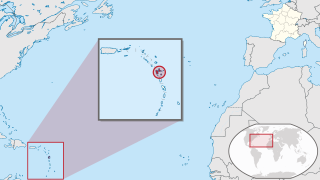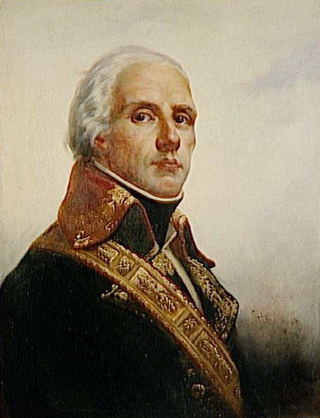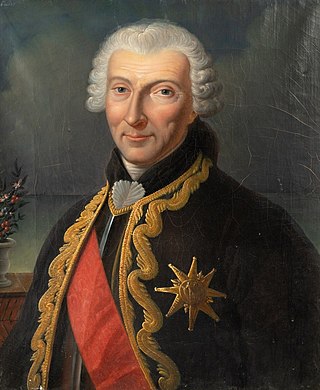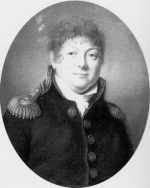Notes
This article needs additional citations for verification .(November 2018) |
Jean Julien Angot, baron des Rotours (2 June 1778 Les Rotours, Orne - 28 March 1844 Paris) was a French colonial governor.
He was born in the castle of Rotours, and entered the French Navy, 11 June 1791, with which he took part in the expedition of 1793 to Santo Domingo, and assisted in the engagement at Cape Français, 21 June, where, although bearing a flag of truce, he was taken prisoner, but afterward released. He went on a United States merchant vessel to Philadelphia, where he was furnished the means of returning to France. He was promoted commander in 1808, and captain in 1814, and 1816-1819 made a successful campaign in the West Indian waters, for which he was created Baron, 25 May 1819. Afterward, he was despatched with a corvette to protect the French fisheries on the coast of Newfoundland, when a difficulty with England threatened to end in war, and was promoted to rear admiral in 1821.
Rotours was appointed governor-general of Guadeloupe in 1826, arrived at Basse-Terre on 31 May, and found that the city had been nearly destroyed by the hurricane of 26 July 1825. He immediately began to rebuild it on a more elaborate plan, and, after inquiring into the wants of the colony, proposed to the king a plan to unify the colonial administration, by which the island was allowed partial self-government through delegates that formed a council general. Rotours also provided means to check the return of yellow fever epidemics, established a hospital and a camp for the soldiers on Matouba volcano, at the coolest station in the mountains, drained the marshes that surrounded Pointe-à-Pitre, executed great works in that harbor, completed the canal named Vatable, and also constructed in Grande-Terre several other canals, which proved of great benefit to the colony. One of these has since received the name of Canal des Rotours. He founded the city of Bordeaux-Bourg, erected schools, churches, and bridges, and opened roads.
Under his administration, Guadeloupe attained a high state of prosperity, and when Rotours obtained his recall in May 1830, regret was felt at his departure. His works include Mémoire sur le mode de procédure criminelle en vigueur à la Guadeloupe (Paris, 1826).
This article needs additional citations for verification .(November 2018) |

Guadeloupe is an overseas department and region of France in the Caribbean. It consists of six inhabited islands—Basse-Terre, Grande-Terre, Marie-Galante, La Désirade, and two Îles des Saintes—as well as many uninhabited islands and outcroppings. It is south of Antigua and Barbuda and Montserrat and north of Dominica. The capital city is Basse-Terre, on the southern west coast of Basse-Terre Island; the most populous city is Les Abymes and the main centre of business is neighbouring Pointe-à-Pitre, both on Grande-Terre Island. It had a population of 395,726 in 2024.

Basse-Terre is a commune in the French overseas department of Guadeloupe, in the Lesser Antilles. It is also the prefecture of Guadeloupe. The city of Basse-Terre is located on Basse-Terre Island, the western half of Guadeloupe.

Pointe-à-Pitre is the second most populous commune of Guadeloupe. Guadeloupe is an overseas region and department of France located in the Lesser Antilles, of which it is a sous-préfecture, being the seat of the Arrondissement of Pointe-à-Pitre.

Jean-Baptiste Victor Hugues was a French politician and colonial administrator who served as the governor of Guadeloupe from 1794 to 1798. He is best known for his actions during the French Revolutionary Wars, where Hugues played a major role in implementing the Law of 4 February 1794 which abolished slavery in France's colonies.

Jacques François Coquille, known as Dugommier, was a French military leader during the French Revolutionary Wars.

The Îles des Saintes, also known as Les Saintes, is a group of small islands in the archipelago of Guadeloupe, an overseas department of France. It is part of the Canton of Trois-Rivières and is divided into two communes: Terre-de-Haut and Terre-de-Bas. It is in the arrondissement of Basse-Terre and also in Guadeloupe's 4th constituency.

Gabriel-Mathieu Francois D'ceus de Clieu was a French naval officer and the governor of Guadeloupe from 1737 to 1752 and the founder of Pointe-à-Pitre. He was awarded the rank of commander of the Royal and Military Order of Saint Louis.

Pierre-Clément de Laussat was a French politician and the last French colonial governor of Louisiana, handing over the territory to the United States after the Sale of Louisiana. He later served as colonial official in Martinique and French Guiana, as well as an administrator in France and Antwerp.

Antoine Richepanse was a French Army officer and colonial administrator. Richepanse was born in Metz as the son of an officer of the Conti-Dragoon Regiment. When the French Revolution started Richepanse distinguished himself in the early battles of the French Revolutionary War, and by 1794, he had been promoted to général de brigade.

Jean Boudet was a French général de division of the French Revolutionary Wars and the Napoleonic Wars. The campaigns in which he was involved include the Saint-Domingue expedition. He was made a grand officer of the Légion d'honneur on 2 June 1809 and a knight of the Order of the Iron Crown, as well as a Comte de l'Empire in 1808. His name is engraved on the 16th column of the east side of the Arc de Triomphe in Paris.
Colonel Julien-Désiré Schmaltz or Julien Schmaltz was a French colonial administrator and governor of Senegal from 1816 to 1820.

Roch-Ambroise Auguste Bébian was one of the first hearing educators in France to achieve native-level fluency in French Sign Language. In 1825, he published an important book, Mimographie, which utilized a method of writing signs.

Manuel Louis Jean Augustin Ernouf was a French general and colonial administrator of the Revolutionary and Napoleonic wars. He demonstrated moderate abilities as a combat commander; his real strength lay in his organizational and logistical talents. He held several posts as chief-of-staff and in military administration.
Jean Jullien may refer to
Charles Liénard, sieur de L'Olive was a French colonial leader who was the first governor of Guadeloupe.
Baron Henri Édouard de Copley was interim Governor of Guadeloupe from 1764 to 1765.

Louis Hippolyte de Lormel was a French colonial administrator who served as Governor of Guadeloupe from 1864 to 1870, and of Réunion from 1869 to 1875.
Louis Antoine de Thomassin de Peynier, known as Antoine de Thomassin, comte de Peynier was an officer of the French Royal Navy and a colonial administrator of the Kingdom of France.